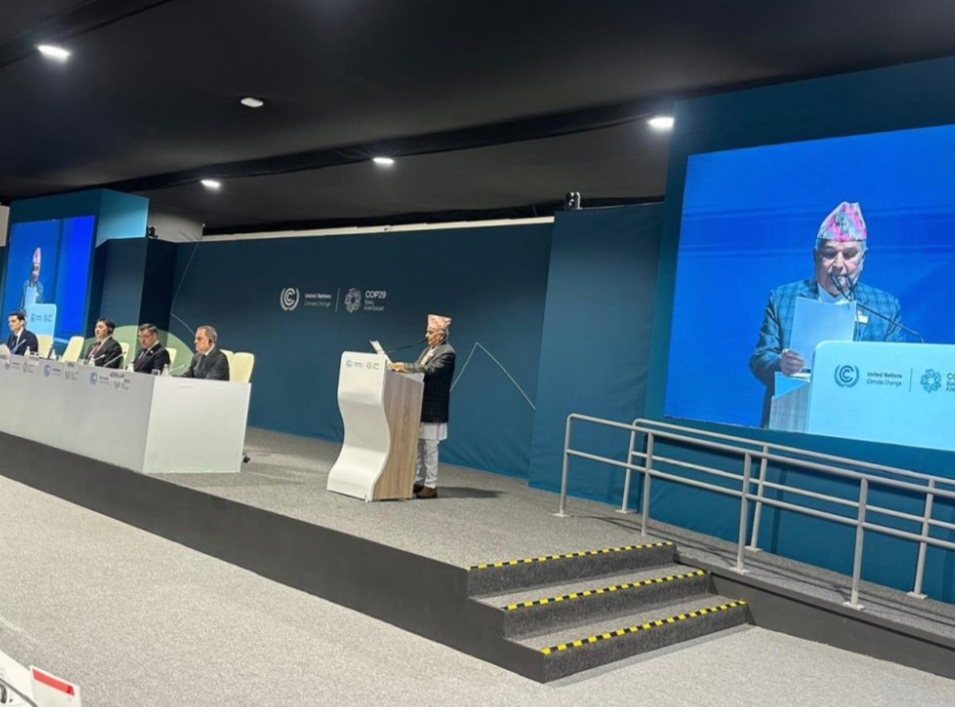Baku, Azerbaijan — At the 29th United Nations Climate Change Conference of the Parties (COP29), Nepal took a resolute stand, bringing attention to the mounting climate challenges that disproportionately affect poor and least developed nations. Delivering a keynote address, President Ramchandra Paudel underscored the devastating toll that climate change has taken on Nepal, highlighting an urgent need for global support in addressing the impact of natural disasters, health issues, and the depletion of critical water sources.
President Paudel emphasized the urgency for climate justice, demanding that wealthy and industrialized nations contribute more to mitigate the damage faced by vulnerable nations like Nepal. The President advocated for an equitable approach, urging the application of the "polluters pay" principle to climate finance mechanisms, ensuring that those most responsible for greenhouse gas emissions bear the cost of climate adaptation and recovery.
Impacts of Climate Change on Nepal
Nepal, a country particularly vulnerable to the impacts of global warming, has experienced increased frequency and intensity of climate-induced disasters. In recent years, extreme weather events have caused unprecedented rainfall and landslides, devastating infrastructure, displacing communities, and threatening livelihoods. The 2021 Melamchi River floods in Sindhupalchowk district and recent heavy rainfall in Kathmandu Valley serve as stark reminders of the risks posed by climate change. Rising temperatures and erratic weather patterns, exacerbated by global warming, have significantly impacted agriculture, biodiversity, health, and ecosystem stability in the region.
Nepal’s Ongoing Efforts and Need for Support
Highlighting Nepal’s proactive role in combating climate change, President Paudel detailed efforts such as afforestation, enhanced production, and a shift towards clean energy sources. However, he expressed concern that the challenges presented by global warming are rapidly outpacing Nepal’s available resources and capacity. Least developed countries like Nepal contribute negligibly to global emissions yet are forced to bear the brunt of the adverse effects.
In light of this, the President called for a financing mechanism that recognizes Nepal’s contributions to global biodiversity, the Himalayan cryosphere, and the vital role the country’s vast forests play in carbon sequestration.
New Agreement on Climate Resilience Projects
In a significant development at COP29, Nepal’s Ministry of Forest and Environment signed an agreement with the Global Environment Facility (GEF) to implement two major climate resilience projects in Nepal. With a combined investment of USD 10.5 million, the initiatives will focus on watershed conservation in the Marin area of Sindhuli district and capacity-building for transparent climate reporting. These projects, set to span two to five years, represent a meaningful step towards fortifying Nepal’s resilience against climate threats.
A Call to Action for Global Unity
President Paudel’s address resonated with a powerful message: that addressing climate impacts in vulnerable regions must be a collective responsibility. His remarks reinforced Nepal’s commitment to sustainable development while urging developed nations to acknowledge their role in supporting countries that are less equipped to handle the escalating climate crisis.
As Nepal continues to experience firsthand the realities of climate change, its voice at COP29 amplifies the call for immediate and just global action to protect the planet’s most vulnerable.